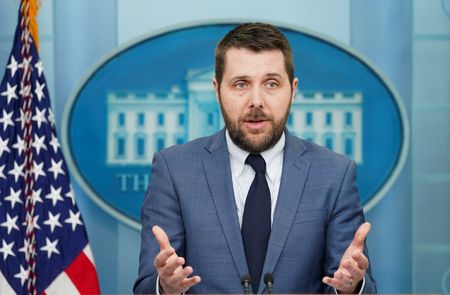By Andrea Shalal
WASHINGTON (Reuters) -White House economic adviser Brian Deese said on Tuesday he was not surprised by the negative reaction of financial markets to Britain’s fiscal plans and tax cuts, underscoring the need to maintain “fiscal prudence, fiscal discipline.”
Deese, speaking at an event hosted by the Economic Club of Washington D.C., said Britain’s plans came during a cycle of monetary tightening and had put the monetary authorities in a position of potentially having to tighten even further.
“In a monetary tightening cycle like this, the challenge with that policy is that it just puts the monetary authority in a position potentially to move even tighter. I think that’s what you saw in reaction,” said Deese, director of the White House National Economic Council.
“It is particularly important to maintain a focus on fiscal prudence, fiscal discipline,” he said.
Deese’s comments came hours after the International Monetary Fund took aim at the British financial plans, warning that “large and untargeted fiscal packages” would likely increase inequality in Britain and could undermine monetary policy.
In its first comments on plans by Britain’s new finance minister, Kwasi Kwarteng, that have sent sterling and bonds into free fall, the IMF urged British authorities to consider providing more targeted support to families and business instead of sizable tax cuts and sharply higher government spending.
Deese told reporters after the event that the strength of the dollar reflected the relative strength of the U.S. economy.
“In a highly uncertain global environment … what we’re seeing is reinforcing the unique position of strength that the United States economy is in, notwithstanding all the complexity of our recovery,” he said.
Asked if he was concerned about the spillover effects of weaker economies elsewhere on the United States, Deese mentioned Europe, Britain and China, and said the Biden administration was paying “a lot of attention” to pockets of “particular weakness” in the global growth trajectory.
Asked during the event if the U.S. economy was heading into a recession, Deese cited signs of resilience, including consumer and business balance sheets and investments.
“We’re certainly in a complicated and in many ways unprecedented transition, but I think that there’s a reason to have a lot of confidence in the U.S. position, in the context of globally uncertain climate,” he said.
He said Britain and Europe faced a very difficult situation and were significantly more exposed to energy price volatility.
Deese also said he thought the military and “cascading economic problems” facing Russia after its invasion of Ukraine on Feb. 24 were putting increasing pressure on the country.
(Reporting by Andrea Shalal; Editing by Sandra Maler, Robert Birsel)





